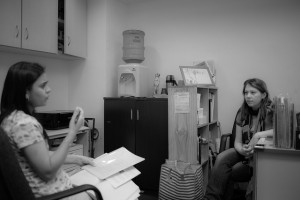
This study looks at how to incorporate practical understanding of reflective practice into social work education.
Social work in The Netherlands as well as in the UK has experienced a drive towards competence-based education. Competence approaches to assessing students can bring clarity, transparency and increased uniformity. However, they have also been dismissed as anti-intellectual, tick box systems that don’t address the abstruse and unpredictable realities of practice or equip practitioners with the ability to make professional judgments in the face of messy situations.
It is reflective practice that is offered as the means to clear thinking in the face of this complexity. Reflective practice means consciously looking at and thinking about experiences and feelings and responses in order to learn from them. It is this that enables us to understand the uniqueness of each situation (Ruch, 2002).
The process of reflective practice is widely taught on social work courses in The Netherlands where this study took place and also in the UK. It is a difficult concept to grasp and the writers note that courses are more likely to teach the process of reflection rather than how to actually do it. Social work readers will remember learning Gibbs’ cycle of reflection; experience, feelings, evaluation, analysis, conclusion and action. Practitioners often say that it is not until they are out in practice, and then, only with support from a good supervisor, that reflective practice begins to make sense.
In this study, Hermsen and Embregt look at how an Ethics of Care perspective might help embed a real understanding of reflective practice in social work courses and practice. Their suggestion is that the ‘value charged label…..’connection of relationship’’ should be added to the reflective process.
Ethics of Care prioritises the relationship between practitioners and the people they support. Its premise is that all involved should have a voice and be respectfully heard (Gilligan, 2011) . The writers suggest that good reflective practice encompasses Ethics of Care by incorporating an ‘inner-engagement’ with the work; our ability to be reflective practitioners, they suggest, is partially affected by the kind of people we are as well as what we do.
This understanding is embedded in ‘Professional Loving Care’ (PLC), an Ethics of Care model that sees a reciprocal element in relationships between healthcare professionals and their patients. It recognises the need for professional knowledge and skills but also for an inner motivation to care. PLC also requires an understanding of how institutional socio political structures influence and shape worker/client relationships.
The research interviews described in this study ask how the doing of reflective practice can be better included in social work education from a “PLC perspective”.

The researchers asked social work teachers, managers and ethicists about how to apply PLC in education and practice.
Methods
Two studies of semi-structured qualitative interviews were conducted across 19 social work teachers, supervisors, human resources managers and PLC ethicists from 8 different services. The aim was to identify how to structurally apply PLC into social work education and practice.
Results
The interview respondents created a framework of 12 topics to enable a PLC approach to reflective practice to be incorporated into social work education.
| Experiential learning
|
Students getting to know clients and hearing their stories |
| Reflection on on-going professional development | Focus on own moral development, need for teachers and supervisors to act as role models, use of trainers, actors and video to enhance creativity, imagination and empathy |
| Giving and receiving feedback | From peers, teachers and supervisors. Developing self-consciousness |
| Role of practice supervisor | Practice supervisors as role models. Close collaboration between teachers and supervisors |
| Professional reporting | PLC attitude reflected in report writing; students to learn how to show respect for clients when recording |
| Conceptualisation | Independent thinking, critical thinking, use of theory |
| Assessment | Students judged on PLC as well as knowledge and practical skills. |
| Connecting to authentic motivation | Can’t be authentically attentive to others unless attentive to our own motives. Universities need to understand what makes people suitable practitioners |
| Respectful Treatment | Empathic and respectful tuning in to the client and their family, seeing the person more than the disability. Also requires tuning in to the employing organisation |
| Demand Oriented Working | ‘question behind the question’; what’s really wanted by the client? Ability to tune-in to individuals, and reject the temptation to take a patronizing, paternalistic approach |
| Collaboration between Education and Practice | Clarification of expectations of future practitioners with regards to PLC |
| Preparing to Practice | Ability to understand and cope with team dynamics as well as complexity and driving forces of large organisations. |
Conclusion
This framework demands an understanding of inner motivations as well as relational understanding and a conscious personal involvement and reciprocal connection with clients. It also involves understanding how institutional and socio-political frameworks impact on our ability to make these connections. For social workers in England for example, how would the Professional Capabilities Framework requirement for personal/professional boundaries support PLC’s (albeit non-romantic, non-sexual), demonstration of love?
Strengths and limitations
It’s a small survey and it hasn’t included people who use services or social work students which means that the views of the two main players in the client/student practitioner relationship aren’t actually represented here. However, the results offer a suggestion for an effective motivational based framework for developing the ability to reflect from a PLC perspective. The sting is in the authors’ own critique which is that the question of whether PLC actually improves practice is largely untested.
Discussion
Reflective practice is tricky to teach in the classroom. We can try out the models but often only when in detailed reflection on real life situations does reflection begin to make sense. An Ethics of Care approach starting with why we are here/why we care (first question asked at any social work interview!) and examining how our genuine desire to help can be supported or hampered by structures within which we work may offer a shift away from the competence based ‘what we do’ to the motivational based ‘why and way that we do it’.
Good reflection demands experience, knowledge and critical thinking. For many students, it’s difficult to draw on these when starting out on their social work course but as long as universities do understand what makes good practitioners, we should have students with authentic motivation upon which to build reflective skills. Competence approaches can effectively measure actions but if it ain’t just what we do, but the why that we do it, examining and building on relationship connections should be a helpful way in.

Good reflection demands experience, knowledge and critical thinking and is difficult to teach in the classroom.
Links
Primary publication
Hermsen, M., & Embregts, P. (2015). An Explorative Study of the Place of the Ethics of Care and Reflective Practice in Social Work Education and Practice. Social Work Education, 34(7), 815-828.
Other citations
- Ruch G. From triangle to spiral: Reflective practice in social work education, practice and research. Social Work Education: The International Journal 2002; 21(2): 199-216.
- University of Cumbria. Gibbs’ (1988) Reflective Cycle (PDF). Academic Liaison, Employability and Skills (ALES)
- van Heijst A. Professional Loving Care: An Ethical View of the Healthcare Sector. Ethics of Care 2011; VI-212 p.

An Ethics of Care perspective for teaching reflective practice in social work education @tanyamooreherts
https://t.co/iKPJ7hl7XG
@tanyamooreherts Ethics of Care prioritises the relationship between practitioners and the people they support. https://t.co/0q08hszW1w
My blog for @SocialCareElf An Ethics of Care perspective for teaching reflective practice in social work education https://t.co/uvk9uUgfaJ
An Ethics of Care perspective for teaching reflective practice in social work education https://t.co/XYg293lRgA via by @TaviTanya ?
@tanyamooreherts reports on a qualitative study on how to structurally apply PLC model to social work education https://t.co/0q08hszW1w
Check out the latest blog by @TaviTanya on reflective practice in social care ed – An Ethics of Care perspective https://t.co/7223lvA6XR
? @TaviTanya @SocialCareElf An Ethics of Care perspective for teaching reflective practice in social work education https://t.co/XXxupmNRJP
‘It ain’t what we do, it’s the why that we do it’. Teaching reflective practice; My blog for @SocialCareElf https://t.co/uvk9uUgfaJ
@tanyamooreherts 12 topics to enable a PLC approach to reflective practice in social work education https://t.co/0q08hszW1w
@tanyamooreherts Reflective practice demands experience, knowledge and critical thinking. https://t.co/0q08hszW1w
@wwwframeworks4c was thinking about you when wrote blog abt ‘professional loving care’. This approach may interest u https://t.co/uvk9uUgfaJ
@SchrebersSister ‘it ain’t what we do, it’s the why that we do it’; Banarama approach to teaching reflection?https://t.co/uvk9uUgfaJ
In case you missed it: @tanyamooreherts practical understanding of reflective practice in social work education https://t.co/0q08hszW1w
An Ethics of Care perspective for teaching reflective practice in social work education https://t.co/KOtuUHxi7c via @sharethis